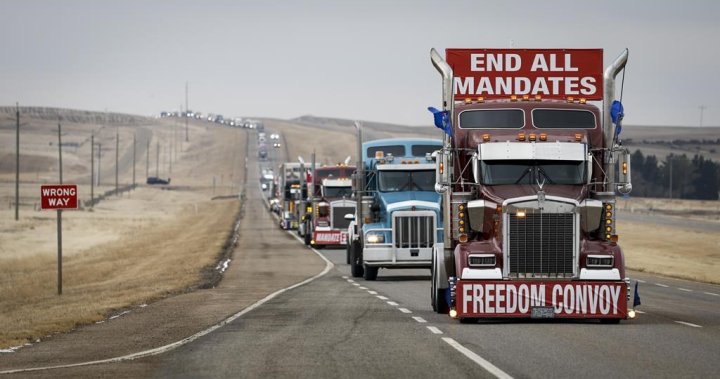A Crown prosecutor said Wednesday that the trial for three men charged over their roles in an Alberta border blockade two years ago has nothing to do with their beliefs or right to protest.
Marco Van Huigenbos, Alex Van Herk and Gerhard Janzen have each pleaded not guilty to mischief over $5,000.
The protest over COVID-19 pandemic health restrictions ground traffic through Alberta’s main border crossing with Montana to a halt for more than two weeks in 2022.
“Many people were affected by COVID-19 and responses to it. This prosecution is not about that,” said Crown prosecutor Steven Johnston, turning to face the eight-man, six-woman jury.
“This trial is not about people’s personal feelings about COVID. This not a trial about the right to protest.”
The latest health and medical news
emailed to you every Sunday.
Johnston told jurors one cannot obstruct the use of a highway in order to achieve a goal. He added the three accused played a “key role” in blocking the highway at Coutts, Alta., a village of around 200.
“The Crown does not allege that these three men before you committed a single act of violence,” he said.
“What the Crown alleges is that they, as part of a larger group, interfered with the use of a large highway in southern Alberta for approximately two weeks. Effectively, they had gained a control valve on Highway 4, the highway that belongs to the province.”
Johnston said the evidence will show the three men were leaders of the protest and had final say over what happened. He said that after 15 days, a single video message the men posted online accomplished what Mounties could not.
“The protest ended shortly thereafter,” he said.
“They were the group that had the ability to turn off and on the blockade.”
Johnston said he would call Jim Willett, the former mayor of Coutts, as his first witness.
Prior to Johnston’s comments, Justice Keith Yamauchi spent 40 minutes giving the jurors their instructions and stressed that the three men are presumed innocent until proven guilty beyond a reasonable doubt.
“You are the judges of the facts … not lawyers, not investigators,” Yamauchi said.
“You must determine if each of them is guilty or not guilty of the charge they are facing. It is important that you not form your opinions before you hear all the evidence.”
The trial is scheduled to run until April 19.
© 2024 The Canadian Press




